SmartSearch is a rogue extension created and promoted by findflarex.com with a direct intention to redirect users to boyu.com.tr while taking away their ability to revert to a legitimate search engine. At this point there have been numerous such extensions which operate in exactly the same way.
SUMMARY:
| Name | SmartSearch |
| Type | Browser Hijacker |
| Detection Tool |
Some threats reinstall themselves if you don’t delete their core files. We recommend downloading SpyHunter to remove harmful programs for you. This may save you hours and ensure you don’t harm your system by deleting the wrong files. |
SmartSearch Removal Guide
Try the net couple of steps for a quick fix. It sometimes (most of the time – not) works for extensions that promote boyu.com.tr. But if you are lucky, this will save you a lot of time and effort.
- Go to the affected browser, go to the Settings page > Extensions.
- Look for a SmartSearch extension or any other browser add-on and click the Remove button.
- Head over to the search engine settings. Restore your preferred search engine, such as Google. Once done, restart your browser.
I would be very surprised if this works, but it sometimes does, usually when the extension is no longer used by the criminals and it’s a leftover. If it doesn’t work, just proceed with each step down.
How to Get Rid of SmartSearch “Managed by” Policies
If the above didn’t work, it was because you were locked out of doing any changes – this is made through a system group policy. A “Managed by your organization” message signifies this, and you’ll have to remove it to unlock the relevant settings.
Open Chrome, Edge, or whichever browser got affected. In the address bar, type chrome://policy for Chrome, edge://policy for Edge, or a similar URL with adjusted browser name, then hit enter. Firefox is not supported with this method, just go down and proceed to the next step.
Look at the values of the policies in there. If they look like a random jumble, copy paste them somewhere for later.
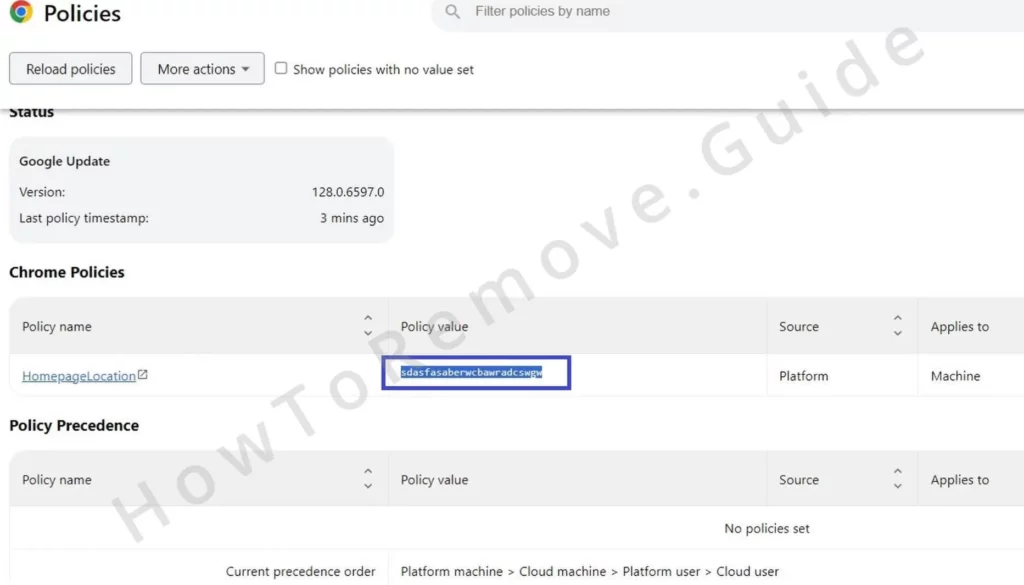
Afterward, try accessing the Extension Manager again.
Some hijackers block access by redirecting you to Google or another page. This is the easy way to sidestep this:
Make hidden files and folder visible in your system – search for for Folder options in the windows menu > View > Show Hidden Files and Folders > OK.
Open this folder (please note were it says your user name) C:\Users\[YourUsername]\AppData\Local\Google\Chrome\User Data\Default\Extensions – delete all folders there.
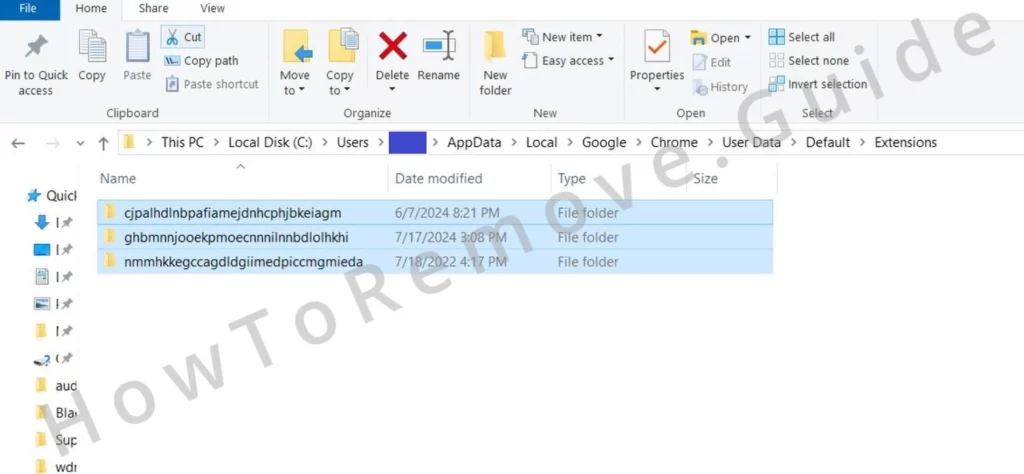
Visit the extensions tab again. You will be able to access it now. Turn on Developer Mode once there.
Look for the IDs of the rogue extensions. Copy those IDs too and save them next to the policy values. You’ll need them for deeper cleanup.
How to Remove SmartSearch Virus Items From the Registry
Hit Win + R, type “regedit” in the box and press Enter.
Once inside, press Ctrl + F to search and paste one by one each of the values or IDs collected earlier. Delete the entire key (folder in the right panel) associated with any value you find.
Search until regedit says there’s nothing else to find.
If for some reason you’re not allowed to delete a certain key:
Right-click the key that contains the one you are trying to delete (its parent key), and select Permissions. Select “Advanced” > “Change”, type “Everyone” > Check Names.
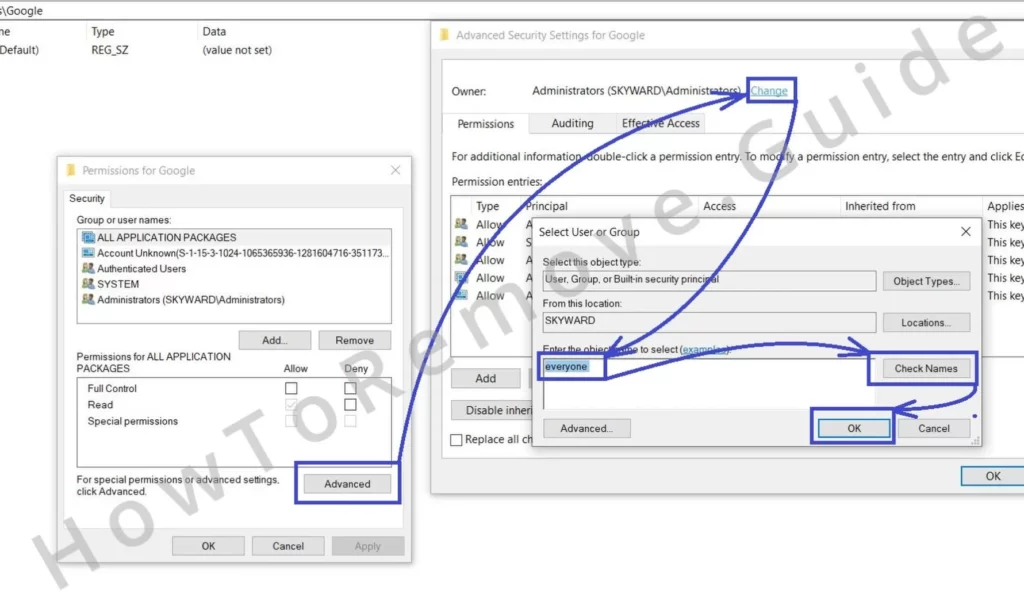
Hit OK, and check the two new “Replace” options that should appear in the previous window.
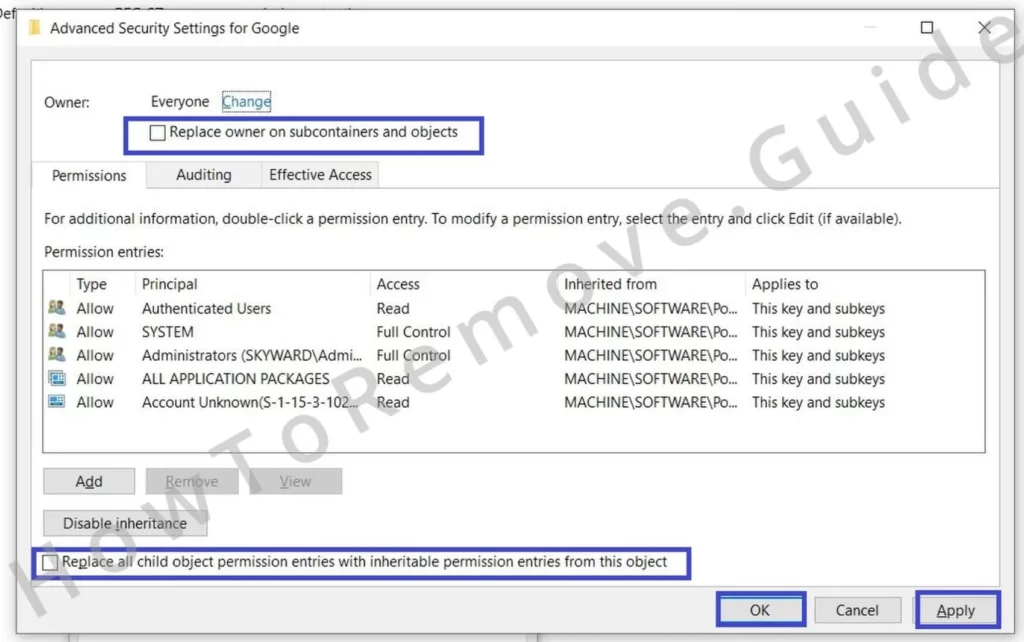
Apply the changes and save them.
Uninstall the SmartSearch Virus Extension From Your Browser
It’s time for the final part.
Open your browser, go to Settings > Extensions. Delete all the undesired extensions in there, like SmartSearch. Click Repair on any extension you want to keep.
Next go to Privacy and Security > Clear your browsing data. Make sure to cover the timeframe from when the hijacker first began bothering you.
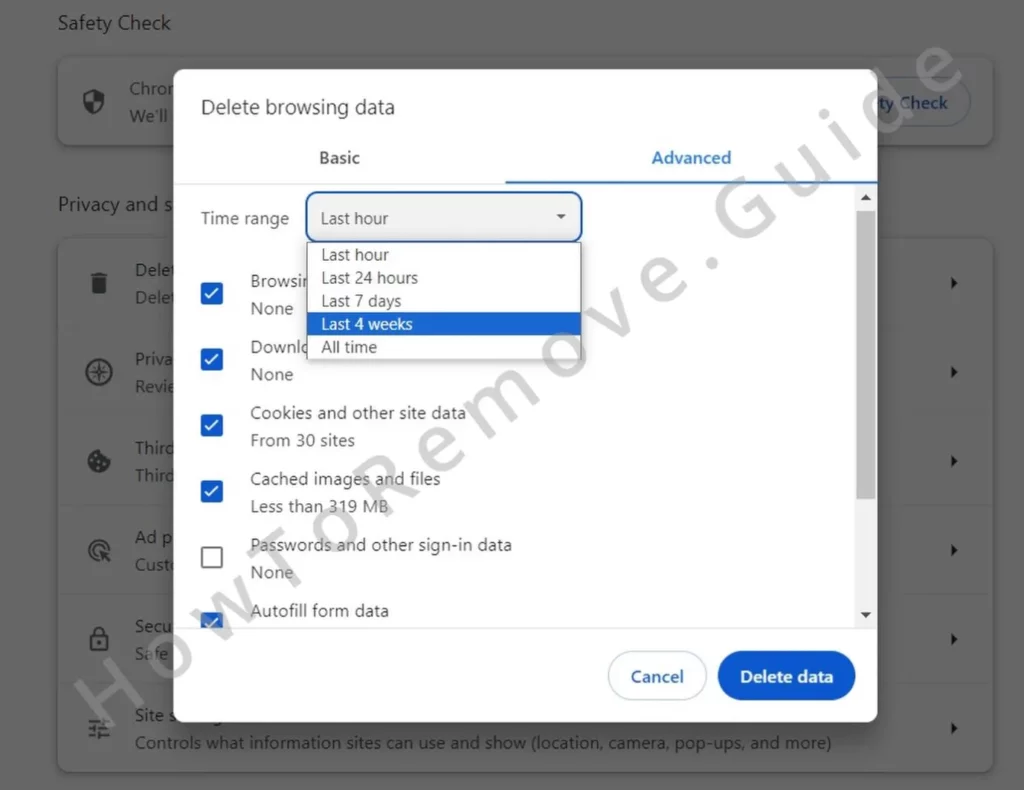
Check your search engine settings. Make sure only your preferred search tool remains.
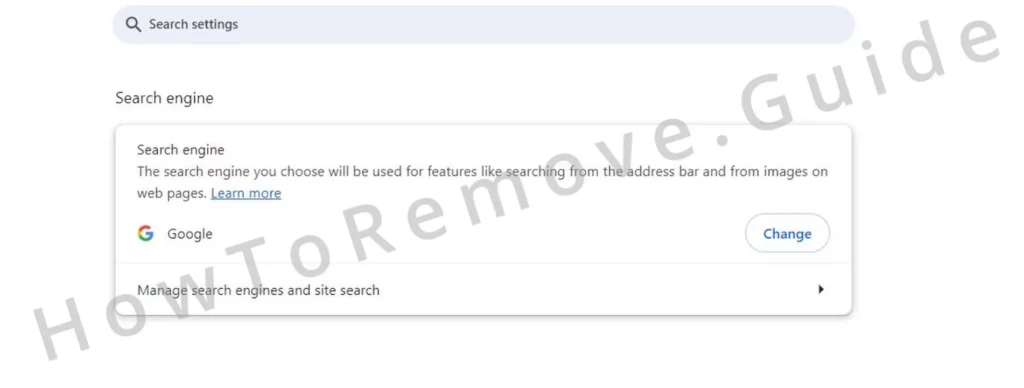
At this point, your browser should be free from any remaining traces of SmartSearch.
What Is SmartSearch And Should You Be Worried About It?
SmartSearch is a rogue browser extension that sneaks into the systems of users mostly thanks to their lack of attention and care when browsing the web and downloading new apps. If you are among the people who have it inside their browsers, you should know that it lacks the ability to cause direct harm. This rogue software hijacks your browser settings and can redirect you to potentially dangerous sites but won’t directly damage anything.
The removal of this hijacker is still critical even if it’s not on the same level as viruses or Trojans. You need to get rid of SmartSearch or else you risk exposure to more serious threats. Rogue browser extensions like it can easily lead to privacy invasions or even hacker attacks. They also rarely offer anything worthwhile – even if the hijacker promises you a helpful function for free, most of the time it will be something you don’t really need or that you can already do in Windows by default.
SmartSearch – Risks and Dangers
SmartSearch isn’t designed to cause harm or corrupt data, but this doesn’t make it safe. It will modify the settings of your system with the goal to gain Admin privileges on your PC so it can spam you with ads and other promotional content. This is annoying, but the real issue is that the changes can weaken your virtual defenses and make it easier for other malware to attack.
The adverts that come from the hijacker are another problem. They can be incredibly misleading and redirect you to malicious sites instead of the products or services they promise. This deception can make you the target of phishing scams or, if you aren’t careful, you may even end up downloading more malware onto your system.
You likely got the hijacker after you installed some questionable app from a seedy source. The app in question might be unsafe itself or at least enable the presence of the hijacker and prevent its removal. Such apps might also run hidden cryptomining scripts to hijack your system’s resources for added profit. The result for you will be sluggish performance and increased energy consumption on top of the annoyances you are forced to put up with when you open your browser.
The good thing about hijackers and the apps that carry them is once they are removed, your system and browser should be back to normal without any lasting consequences (unless you’ve landed yourself something more serious in the meantime). In either case, if SmartSearch is bothering you right now, you really have no reason to delay its removal any further. Delete the hijacker with the help of the guide below before its ads have lured you into a phishing scam or before its system changes have made you a target for more serious malware.
What Do the Creators of SmartSearch Want?
Most hijackers like SmartSearch are all about that quick buck through various seedy advertisement methods. They’ll try to generate artificial traffic for various websites through redirects that happen without your consent or promote them through ads and modified search results. The result is that the visibility and revenue for those sites go up, regardless of their legitimacy. The site owners will, in turn, pay good money for the bump in traffic, which generally gets hijacker owners to close their eyes to any sketchy activities that may be going on there. It’s a win-win situation for all parties involved. All except the millions of users struggling to restore control of their browsers.
But that’s not the only way SmartSearch can make money. Its creators are fully aware that it won’t be long before the user notices the annoying component and boots them from their PC, so the hijacker needs to be as profitable as possible during the short amount of time it has on that particular computer. In addition to redirecting traffic, SmartSearch will collect user data which it uses for targeted ads and/or sells to third parties. Who are those third parties? No one tells you and you’ll never know. All you can do is hope that they aren’t hackers/scammers who want to use that info to more easily target you with their scams and malware.
The creators of SmartSearch are not out to directly damage your system. They want to make money off your back, but it doesn’t mean they seek to cause harm as it won’t profit them. However, they also have little concern for the negative impact on your system’s performance, its security, or for your virtual privacy. They just want to monetize your browsing activity. If this means your system will be left vulnerable and scammers and hackers will target you isn’t something they care about.
How SmartSearch Spreads and How to Avoid It From Now On
There are many crafty methods that are used to spread hijackers such as SmartSearch, but there’s one that stands above the rest, and we want to focus on it here. That method is called file-bundling, and it’s a common tactic where the hijacker is hidden within seemingly legitimate software downloads – this is the method that most likely got you SmartSearch.
The way it normally works is that users download software from untrusted sources and then don’t pay attention to the installation settings. It’s obviously a good idea to stick with legitimate providers because this will minimize the risk of getting these unwanted extras, but it’s just as important (if not more) to closely examine the options in the setup menu before hitting “Install”.
The effectiveness of this method should show you how hijackers mainly rely on user carelessness to spread. The situation is similar with the other tactics used for the distribution of such unwanted apps. Hijackers often get installed because users click on fake system notifications or update prompts that come from seedy pages and not from any program on the computer.
These deceptive messages persuade or even intimidate users and the more gullible ones will download the malicious software without even stopping to think about whether it’s a good idea. Always be cautious with unexpected pop-ups and alerts that don’t seem linked to any of your programs. We advise you to always take a couple of minutes and evaluate and research any strange prompts you see on your screen. Most of the time, this will be enough to determine if it’s something legitimate or an attempt to get a hijacker onto your PC.

Leave a Reply